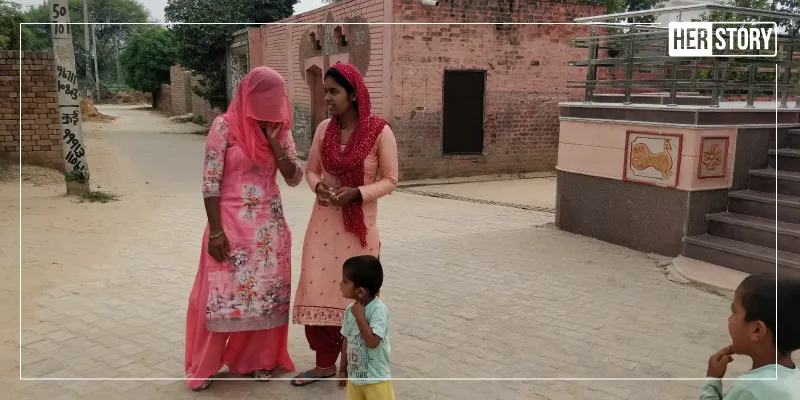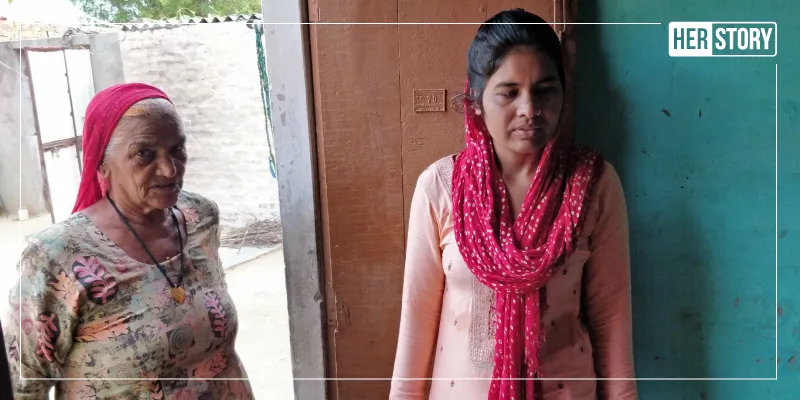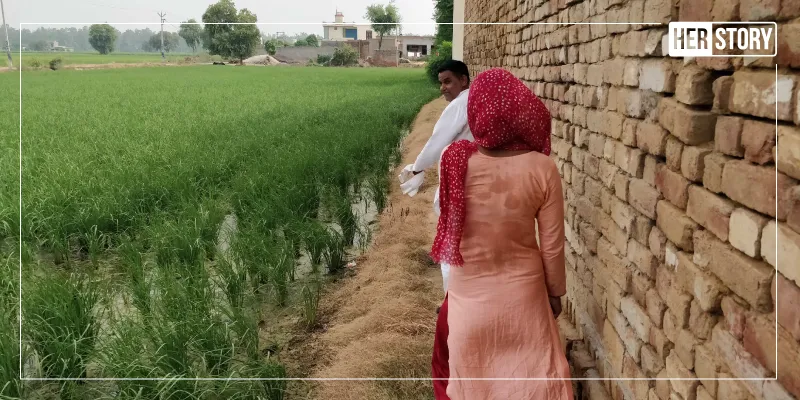Here’s how Haryana’s youngest female Sarpanch spent five years in power
Twenty-one-year-old Rekha Rani became the Sarpanch of her village Chapla Mori in Fatehabad district in Haryana as she was one of the few women in the village with the necessary educational qualification.
Rekha Rani was just 21-years-old when she became the Sarpanch of her village Chapla Mori in Fatehabad district in the Haryana hinterland in 2016. It was for the first time that Chapla Mori was going to have its own Gram Panchayat separate from Dhani Miyankhan and Salam Khera, which had been the case for decades. The state election commission had made it mandatory for Chapla Mori to have a female Sarpanch from SC/ST background who had educational qualification up till eighth grade.
Rekha, who had completed school, was the only woman in the hamlet ticking all the boxes, and hence the elders (men) in the village decided that she would hold the post. When this decision was made, she was still a few days short of the legal age of becoming a Sarpanch, and was working in a Burger King franchise in Chandigarh.

Rekha Rani in her village in Haryana
Rekha lucked out in becoming a Sarpanch as she was one of the few women in the village with the necessary educational qualification, and there’s a reason for it. Her village, even to this day, only has a primary-level school, and to study further, children are forced to travel to Bighar, a neighbouring village almost five kilometres away with no proper road infrastructure. Add to it, the regressive and patriarchal social construct of a typical Haryana village that consistently subjugates its women.
However, belonging to a comparatively progressively family, Rekha was allowed to study further.
“I would go to Bighar on a cycle, which would take me at least half an hour to and fro to attend school. There was hardly any other girl accompanying me a few years ago, so the journey would be lonesome, but I wanted to study as much as I could,” Rekha says.
“I was good in studies, but my family didn’t have enough money to let me study further. Hence, I had to quit studies after I passed Class 12 and look for employment opportunities,” adds Rekha, who went on to do vocational training under Deen Dyal Upadhyay Grameen Kaushalya Yojana after which she got a job at Burger King in Chandigarh in 2015. At that time, her father Bansi Lal, a farm labourer, was the sole breadwinner in the family.
This was the first time Rekha stepped out of her house to move to not just a different village, but a city altogether.
“I learnt how to be responsible for myself when I moved to Chandigarh. I felt I could make decisions for myself without any intervention, and that my parents trusted me enough to send me to a far-away city. I really liked that. In Chandigarh, I loved how people communicated with each other,” reminisced Rekha. Her journey inspired many families in her village to educate their girls and send them out for work too.
At the tail end of her first month at work, Rekha’s first salary of Rs 10,600, minus the Provident Fund (PF) was handed out to her. She returned home after two months in service and gave away Rs 10,000 to her parents that she had saved after paying for her essential expenses.

Change in the village
During this time, her father told her that she must file her nomination for Sarpanch in October 2015. She contested against Nirmal Rani and won the elections by 220 votes after polling 610 votes.
Rekha’s mother Krishna Devi was the happiest after she became the Sarpanch. “She has made me proud for the coming three generations and changed the lives of everyone in the family,” said Devi, adding that it was only after Rekha became Sarpanch, we could build a house for ourselves. However, due to the pandemic, the house continues to be under-construction.
“I continued my job in Chandigarh after becoming the Sarpanch for two years as our Gram Panchayat was new and there wasn’t much work. But slowly, the village locals started to object that every time my signatures were required for official work, they had to wait for me, so I quit my job in 2017 and moved back to the village for good,” says Rekha.
Despite becoming a Sarpanch, Rekha took some time in settling down, while her father primarily tended to the duties. While she would go with him when the panchayat convened, she was hardly the decision-maker. In cases of conflict resolution, Rekha’s position didn’t help much as the male elders of the village proved their dominance.
During her tenure, which ended early this year, she may not have drastically improved the quality of villagers’ lives as she claimed at the beginning as the government school in the village continues to be a primary school teaching students only from pre-nursery to Class 5. But she built two sheds and managed some repair work of the roads.
Women don’t stand a chance in gender agnostic elections
While Rekha and the villagers agree that her becoming a Sarpanch is a major push for other women to become a Sarpanch in the future, when pestered on whether she would have a chance if the elections were on a common gender ground between men and women, Rekha hesitatingly says,
“If I was to contest opposite a male candidate, I wouldn’t even have a chance to contest. Maybe things will change in the future. Maybe men will think that women should also be given a chance to become a Sarpanch if the elections were to be gender agnostic.”
Asmani Devi, an anganwadi worker from Chapla Mori, feels proud that a woman became a Sarpanch in her village. “We see a whole lot of progress of women in the village in comparison to the past. But still women can’t possibly become a Sarpanch if there is no reservation.”
One of the elders in the village, Hanuman Bishnoi (70), believes girls in the village don’t get as many opportunities to study more as men do. “We don’t have a proper higher secondary school in the village for girls to study. Boys take their motorcycles to study in other villages, but girls can’t. But if girls get better opportunities to study, they will do better than boys as they are more disciplined,” says Bishnoi.
History is witness to the fact that Haryana Gram Panchayat elections haven’t seen a woman win Sarpanch elections from general category where there is no reservation. Although it cannot be said with surety, women hardly ever even contested against male candidates in Gram Panchayat elections.
Whatever change has come for women to join the governance is through the 73rd and 74th amendments to the Constitution in April 1993. However, close to three decades have passed, but the on-ground reality has hardly seen any difference. Women may now become a Sarpanch on paper, they are almost never the showrunners, it is mostly overseen by their immediate male family member – in Rekha’s case, it was her father.
Dr Santosh Dahiya, national coordinator of Sarv Jaatiya Sarv Khap Mahila Mahapanchayat, has been working with women Sarpanch for over a decade now.
“Women who are compelled to become Sarpanch out of reservation don’t take their jobs as seriously as those who show a passion to contest elections and then become Sarpanch. Contesting elections fair and square is also a huge part of the process, it tells you what you have earned and how to use that position but women who are served the position on a platter don’t value it,” shares Dahiya.

She further expounds that some women who become a Sarpanch without any hustle do feel motivated to contest in the election again when there’s a reservation, but the percentage of such women is miniscule. “It’s mostly their husbands, father or brother who do most of the work, while in some cases women don’t even leave their rooms, let alone houses.”
On whether women can contest in general Gram Panchayat elections, she denied squarely. “Men just won’t let women contest elections if the seat isn’t reserved for women and they just can’t have it. Currently, there’s a very small percentage of men who will allow women in their family to even contest in the elections even if the seat is reserved for women,” she added.
However, Dahiya believes that even forced women’s participation in Panchayat elections is important.
“Women may become Sarpanch for whatever reason, but at some point they have to meet people because of the position they hold and that pushes them out of their comfort zone. It also motivates other women around them to contest elections the next time who may think they can better manage the post of a Sarpanch than the woman before them. So there definitely are some positive outcomes to it as well.”
While stories like those of Rekha are inspiring and encouraging, we must understand the real and grassroot change it brings. If at all there is any change in the mentality of the people on how they view their women and their representation, or is it just on papers that the representation of women sarpanch is growing in the state of Haryana?
Edited by Megha Reddy








